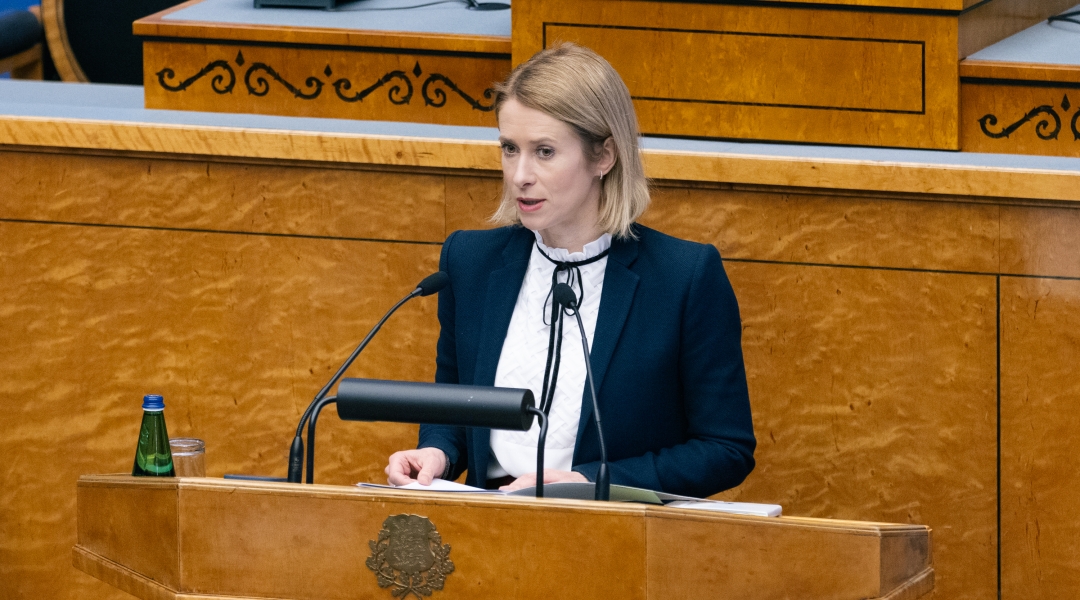The war launched by Russia has caused a shock in the world economy, which will hit our region particularly hard, the Prime Minister said. “We managed to get used to the idea that our prosperity and productivity keep growing. Unfortunately, when the war broke out, they dropped to the levels of a few years ago.” She noted that Estonia has reached the same level of spending as the wealthy countries, but productivity has become lower compared to the wealthier countries. “The current difficulties also offer new opportunities for development and innovation,” emphasised Kallas. “Our target of increasing the volumes of research and development to 3% of the GDP is more important than ever in these challenging times.”
Despite the exceptionally difficult situation with the budget, the government decided to continue moving towards the 3% target and increased the funds allocated to research and development in the state budget – €409 million in the budget for 2024, which is €23 million more than last year. “These funds can be used to increase basic research funding and research grants, as well as services supporting innovation in businesses,” said Kallas.
The Prime Minister pointed out that the growth in research and development investments has been driven by the private sector for several years. More and more Estonian companies see R&D as an opportunity to improve their competitiveness. “While last year we were pleased to see the largest amount invested in research by the private sector, which was €308 million, the investments made by companies increased to €361 million a year later despite the difficult times.”
The Prime Minister also noted Estonia’s rise to 16th place in the global innovation index. In four of the assessed areas, Estonia is the absolute leader, i.e. first among all countries.
“In order to help companies reach innovative products, the state will strengthen services and support. The applied research programme helps companies spread the risks associated with development activities. The Centre for Applied Research will provide more sustained support to the areas with the greatest business potential. Various business accelerators, such as NATO DIANA or the Creative Destruction lab, provide the development support early-stage technology companies need. Innovatsioonitrepp gives the entrepreneur the opportunity to assess the current state of his or her own development, while the state has the opportunity to understand which innovation services are most needed by entrepreneurs at the moment,” the Prime Minister said, listing the state’s support to push companies towards innovation.
The state is moving towards a cross-ministerial research programme with common rules on research funding. “We hope it’ll support the search for solutions to problems with a high societal impact, in cooperation between researchers and practitioners,” the Prime Minister said. In 2023, the Government Office launched its Public Sector Innovation Fund to support innovative solutions and their testing in partnership between the state, researchers and businesses. “For example, the Ministry of the Interior and the Emergency Response Centre are developing a new generation of emergency communication. At the moment, communication with the person in need is either by voice or text message, which is not suitable in all situations. Let’s think of people with special needs or victims of domestic violence, for example.” The Prime Minister emphasised that the public sector must grow the courage to try new things.
Kaja Kallas pointed out that it’s also a time for new beginnings in academic science: “Ten new centres of excellence are about to be launched. For the first time, one of the three criteria used to select them was their impact on society, which means that more businesses, public authorities and other partners are now involved in their work.”
In conclusion, the Prime Minister said that Estonian science continues to be strong and competitive, and has taken a direction towards greater societal impact. “As the state, we’ve ensured stability in research funding and innovation-enabling services for the private sector. Increasing research and development spending suggests that a change in the way companies think and do business is underway, and will also help the economy emerge from the crisis stronger. The goals we’ve set ourselves for 2035 have not lost their importance, but have become more important, which is a sign of good work in setting goals. New elements have been added to the science and innovation ecosystem, such as the innovation ladder, the applied research centre or research programmes based on societal needs. All of them make up for some strategic deficit and create the conditions for tomorrow’s growth,” the Prime Minister said.
“Let’s learn from others, add our own wisdom and common sense, stick together, and then we’ll achieve all that we set for ourselves as a nation and as a country!”
The full text of the prime minister’s speech can be found online at https://valitsus.ee/uudised/peaminister-teadus-ja-arendustegevuse-mahu-kasvatamine-3ni-skpst-keerulistes-oludes-tahtsam.
Gallery: https://www.flickr.com/photos/stenbockimaja/albums/72177720314288074
Prime Minister: Estonian science remains strong and on track for greater societal impact
23.01.2024 | 00:00
Stenbock House, 23 January 2024 – Prime Minister Kaja Kallas stressed in this year’s research and development speech in the Riigikogu that the only way to emerge victorious from crises is to make society and the economy significantly more knowledge-based. The era of low input price production in Estonia is well and truly over, and opportunities for rapid structural change in cataclysms must be seized. Positive shifts in the development of the sector can be seen. In difficult circumstances, the target of reaching 3% of GDP in research and development must be maintained.
